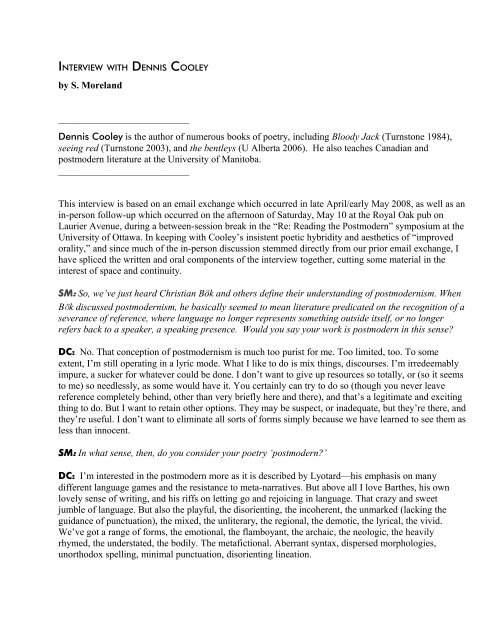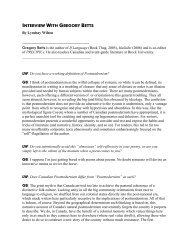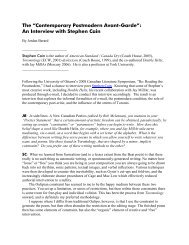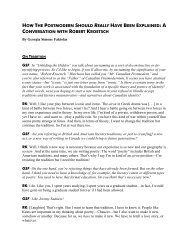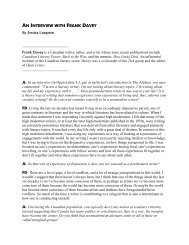Interview with Dennis Cooley - The Canadian Literature Symposium
Interview with Dennis Cooley - The Canadian Literature Symposium
Interview with Dennis Cooley - The Canadian Literature Symposium
You also want an ePaper? Increase the reach of your titles
YUMPU automatically turns print PDFs into web optimized ePapers that Google loves.
INTERVIEW WITH DENNIS COOLEY<br />
by S. Moreland<br />
___________________________<br />
<strong>Dennis</strong> <strong>Cooley</strong> is the author of numerous books of poetry, including Bloody Jack (Turnstone 1984),<br />
seeing red (Turnstone 2003), and the bentleys (U Alberta 2006). He also teaches <strong>Canadian</strong> and<br />
postmodern literature at the University of Manitoba.<br />
___________________________<br />
This interview is based on an email exchange which occurred in late April/early May 2008, as well as an<br />
in-person follow-up which occurred on the afternoon of Saturday, May 10 at the Royal Oak pub on<br />
Laurier Avenue, during a between-session break in the “Re: Reading the Postmodern” symposium at the<br />
University of Ottawa. In keeping <strong>with</strong> <strong>Cooley</strong>’s insistent poetic hybridity and aesthetics of “improved<br />
orality,” and since much of the in-person discussion stemmed directly from our prior email exchange, I<br />
have spliced the written and oral components of the interview together, cutting some material in the<br />
interest of space and continuity.<br />
SM: So, we’ve just heard Christian Bök and others define their understanding of postmodernism. When<br />
Bӧk discussed postmodernism, he basically seemed to mean literature predicated on the recognition of a<br />
severance of reference, where language no longer represents something outside itself, or no longer<br />
refers back to a speaker, a speaking presence. Would you say your work is postmodern in this sense?<br />
DC: No. That conception of postmodernism is much too purist for me. Too limited, too. To some<br />
extent, I’m still operating in a lyric mode. What I like to do is mix things, discourses. I’m irredeemably<br />
impure, a sucker for whatever could be done. I don’t want to give up resources so totally, or (so it seems<br />
to me) so needlessly, as some would have it. You certainly can try to do so (though you never leave<br />
reference completely behind, other than very briefly here and there), and that’s a legitimate and exciting<br />
thing to do. But I want to retain other options. <strong>The</strong>y may be suspect, or inadequate, but they’re there, and<br />
they’re useful. I don’t want to eliminate all sorts of forms simply because we have learned to see them as<br />
less than innocent.<br />
SM: In what sense, then, do you consider your poetry ‘postmodern?’<br />
DC: I’m interested in the postmodern more as it is described by Lyotard—his emphasis on many<br />
different language games and the resistance to meta-narratives. But above all I love Barthes, his own<br />
lovely sense of writing, and his riffs on letting go and rejoicing in language. That crazy and sweet<br />
jumble of language. But also the playful, the disorienting, the incoherent, the unmarked (lacking the<br />
guidance of punctuation), the mixed, the unliterary, the regional, the demotic, the lyrical, the vivid.<br />
We’ve got a range of forms, the emotional, the flamboyant, the archaic, the neologic, the heavily<br />
rhymed, the understated, the bodily. <strong>The</strong> metafictional. Aberrant syntax, dispersed morphologies,<br />
unorthodox spelling, minimal punctuation, disorienting lineation.
SM: In the essays collected in <strong>The</strong> Vernacular Muse, you often refer to Lyotard's <strong>The</strong> Postmodern<br />
Condition. I'm curious about the relationship between your advocacy of a vernacular poetics and<br />
Lyotard's conception of postmodernism as defined by a resistance to meta-narratives. Can you<br />
elaborate on this?<br />
DC: Mostly I had been thinking of it as a way of opposing bullying narratives or claims to universality,<br />
preferring a version of local or unassuming language, considered more or less unfit for poetry, but<br />
having a potential for speaking what I saw as the unspoken or the unheard, the matter and manner of<br />
those whose worlds had perhaps not been accorded much standing in the exalted literary world, or in<br />
what we now misleadingly call the “global” world—a word which often simply masks imperialism. I<br />
myself came from a working-class family and a strong respect for the CCF [ Co-operative<br />
Commonwealth Federation] so I guess I was well-disposed toward the move, always winced when I<br />
heard of "significant" events in history too. <strong>The</strong>y never included people like my parents. <strong>The</strong>y didn’t<br />
much make it into poetry either.<br />
Kroetsch was a big influence, and has continued to be.<br />
SM: In “<strong>The</strong> Vernacular Muse in Prairie Poetry” you write that “the point is to reopen some space for<br />
orality in the face of a print culture which has consolidated itself as the measure of literature, and<br />
which in its applications in the prairies works in damaging ways.” Speaking as someone who is fairly<br />
ignorant of the history and major voices of prairie poetry (I have to confess here that, like Layton's<br />
“Anglo-<strong>Canadian</strong>,” I hail from Kingston, ON, literally and perhaps poetically also...). I am curious<br />
about your predecessors in terms of the poetic exploration of orality, and especially of prairie<br />
vernacular. Who are your major influences in this respect, and what is it that you feel you've<br />
learned/taken from them?<br />
DC: Whoops, Kroetsch again, he especially. It was he who first began speaking and writing about the<br />
use of orality, and he was about the first to use it daringly in poetry. Thing is, from the mid 70s quite a<br />
few prairie poets were writing in a fairly colloquial style, a few years before I myself got seriously<br />
involved as a writer. Andy Suknaski was crucial too. I take it back, Andy did some of these things<br />
before Kroetsch did. Kroetsch combined orality <strong>with</strong> a wild sense of postmodernism, and that was more<br />
enabling to me and I think has had more influence on subsequent writing. <strong>The</strong>re's at least one other<br />
writer here you should know about. Barry McKinnon wrote a brilliant long poem, I Wanted to Say<br />
Something, that Andy put me onto. A dazzling and hardly known text. And then there was arguably the<br />
first really accomplished prairie poem, Anne Marriott's <strong>The</strong> Wind Our Enemy. It used some<br />
conversational lines and it too is a highly effective piece of writing, strikingly contemporary to us in a<br />
number of ways.<br />
<strong>The</strong> thing was, from the mid—70s there was a wild literary ferment in the prairies, and it took a<br />
particular whirlwind at St. John's College in Winnipeg, where I started teaching in 1973. Those were<br />
heady and extravagant days—magazines and readings and presses and conferences and classes and<br />
pubtalk and dreams exploding all over the place, day in and day out. David Arnason was crucial to what<br />
was happening, and he too had a passionate determination that people might write out of the prairies,<br />
and he too drew a bit upon a vernacular style. You might want to have a look at his first book, a very<br />
long poem called Marsh Burning. It's an impressive piece of writing.<br />
SM: Your book Bloody Jack opens <strong>with</strong> a quote from Julia Kristeva concerning Menippean discourse,<br />
wherein she concludes that “the multi-stylism and multi-tonality of this discourse and the dialogical
status of its word explain why it has been impossible for classicism, or for any other authoritarian<br />
society, to express itself in a novel descended from Menippean discourse.” How relevant has this<br />
Menippean discursive legacy continued to be to your work since Bloody Jack? Is this something that<br />
consciously stands behind the hybridization of novel/long poem that both seeing red and the bentleys<br />
represent? Is this a vein you will continue to tap?<br />
DC: I've used Menippea most prominently in Bloody Jack, I think it's fair to say. I hadn't actually heard<br />
of Menippea as Bakhtin and Kristeva conceived of it until I was well into writing BJ. For years (two?<br />
three?) as I was working on BJ I had been thinking of it <strong>with</strong>in a theatrical model. It's a play of voices,<br />
I'd say, a kind of drama. And then Kroetsch came back from somewhere (this would have been about<br />
1983 or so) and he sent me a xerox of a text he'd just been taken <strong>with</strong>. And there it was—Bakhtin talking<br />
about Menippea, and I realized, my god, that's what I'm doing, I'm writing a Menippea! <strong>The</strong> reason I'd<br />
take the term to be more easily applied to BJ that to most of the other books is the crazy array that<br />
jangles through BJ. <strong>The</strong> rest of the books don't have quite that same pell-mell of mixed discourses, I<br />
think, though I would like to think that the other books are in keeping <strong>with</strong> BJ (which is what I was<br />
tempted to call the second edition of Bloody Jack). A few of the books—Fielding and Irene—are much<br />
less Menippean. <strong>The</strong>y've very personal elegies for each of my parents and in them I very deliberately<br />
refused a clutter of voices, though in their own quiet ways they too are multiply voiced, or so it seems to<br />
me.<br />
I'm taken <strong>with</strong> your observation about the applicability of Menippea to the contemporary long<br />
poem. It does fit rather well, doesn't it? It enables us to name that loose assembling of so many different<br />
bits of language, and to do so in resistance and celebration.<br />
Yes, I like to work in that mode, and much of the time I work <strong>with</strong> the thought of gathering material<br />
around some site, not terribly concerned about obvious cohesion or decorum, throwing things together<br />
and alongside, trusting that the pleasure I take in them will play out in rich and enabling connections for<br />
readers.<br />
Allen Ginsberg once said: mind is shapely. I guess I'm acting out of some such notion in my magpie<br />
moves, hauling all the shining things into a hoard. <strong>The</strong>re they are, all those shining things. Well, ok, they<br />
may look a tad tarnished to some, but to me they shine. I’d probably prefer to think of the constructions<br />
as making available pieces that readers might be drawn to and react to.<br />
SM: Following from my previous question, then, was this extended engagement <strong>with</strong> earlier novels<br />
something you had planned from the beginning <strong>with</strong> these projects, or did it gradually evolve? If the<br />
latter, when was it you realized you were (re)writing these books? Does this para-textual engagement<br />
alter how you work, i.e., what kind of methods you deploy while working through the poems themselves?<br />
How did the structure of these novels affect your poetic process (for example, did the syncretic<br />
epistolary form Stoker explores in Dracula, or the diaristic form of As for Me and My House, play a<br />
role in the formation of the often fragmentary and polyphonic poems in these books?)<br />
DC: Wow! A fabulous set of questions! I'll try the easy part first. No, when I first started writing<br />
"seriously," as we say—though there are more than a few readers who would find it hard to think of my<br />
work as "serious"—I hadn't gotten on to that strategy for writing. My first publication was a small<br />
chapbook of sorted lyrics, "Leaving," and I remember worrying that I had used up all my poems there,<br />
and that I wouldn't have any more, ever. I guess that after that I soon began to write and to gather<br />
material around a site. I wrote Fielding, the poem for my father; wrote Dedications, a collection of<br />
poems dedicated to friends; Perishable Light around related poems. Where I really got going on the
series of closely related poems, in a kind of serial long poem, was <strong>with</strong> Soul Searching. Bloody Jack had<br />
begun <strong>with</strong> a rewriting of material from <strong>The</strong> Collected Works of Billy the Kid. I soon bogged down. I<br />
wanted to push on, but I had lost momentum. Well, says Arnason, do we have an outlaw? Anyone from<br />
around here? We both recently had heard a radio broadcast on Jack Krafchenko, who called himself<br />
Bloody Jack, and I was off and running. I found all kinds of wild stuff in the archives but mostly I had a<br />
locale off which I could play.<br />
<strong>The</strong> two texts that draw demonstrably off novels both started at much the same time. In late 1989 I<br />
had been working on a series of fairy tale poems (which appeared a bit later as Goldfinger) and I was<br />
mining that vein, when I began to speculate more widely. Where are there related figures? I hit on<br />
Dracula and wrote a poem which at the time I thought would be part, possibly, of the fairy tale sequence.<br />
And then Dracula took over and I wrote an unspeakably large stack of vampire poems. I waited for a<br />
couple of years before I actually read Dracula, which by the way I think is a really fine book, and yes I<br />
did then use a lot of what I found there. <strong>The</strong> links <strong>with</strong> the Ross novel are pretty strong too, though<br />
there, as in seeing red, I ran very loosely <strong>with</strong> the material.<br />
<strong>The</strong> thing about writing "creatively" is you never have quite the same obligation to your sources as<br />
you do when you are working as a scholar. You're looking for something that can set you off. And off I<br />
set. When I teach creative writing I am forever urging young writers to locate some "place" which<br />
imaginatively fascinates them and then to see where it might take them. Once you get a few permissions<br />
and begin to see possibilities you're on your way.<br />
As for the question of form. . . That’s a tough one, but I really like what you're on to here. I can't<br />
say that I was consciously, or even unconsciously, adapting formal strategies from those novels, not that<br />
I can remember at least. I was heavily aware of the point of view that ran through Ross's novel and<br />
making use of it, deriving perhaps that painful inwardness and paralysis of my main figure in the<br />
bentleys. (By the way there is another book, country music, which comes from that same manuscript,<br />
love in a dry land, a manuscript which at its height, before I began to disburse it, must have been up to<br />
800 pages or so, and is still growing, to this day. I'm intending to add to what I’ve got and to pull a few<br />
more books out of it if I haven't exhausted the possibilities). So the diary form may well have nudged<br />
me into the frequency of Mrs. B's silent ruminations. What I knowingly took from Dracula was a sense<br />
that the discourse of science and technologies, the terms of criminology, the language of banking, and<br />
the force of record-keeping (letter writing too?) were closing in on Dracula. So I began to name him as<br />
an evasion of those constrictions, a figure of circulation in a world of retention.<br />
SM: I’ve got a further question about the bentleys. In an essay on narrative technique in Ross's novel,<br />
critic Paul Denham claimed that “the patterns of imagery through which much of the novel's meaning is<br />
conveyed are densely and carefully worked. [. . .] If we approach the novel as a poem, through its<br />
imagery, or as a model for the <strong>Canadian</strong> identity, we are likely to find it a very important work<br />
indeed.” With the bentleys, you have not only approached the novel as a poem, you have turned it into<br />
one. What was it about Ross's novel that invited your poetic performance? Was the novel's oft-contested<br />
canonical status as a <strong>Canadian</strong> “classic” important in this respect?<br />
DC: I wasn't in any way concerned <strong>with</strong> the status of the novel. Well, that's not quite true. I'm a<br />
ferocious champion of prairie literature and I am happy to see texts from the Prairies getting attention.<br />
For what it's worth I think (and, as I recall, so does Denham) the Ross novel in some ways is a failure,<br />
but it is deeply intriguing. I mean think of what Ross could have done <strong>with</strong> the diary form. He hit on a<br />
great idea and then he hardly made use of the diary. I also think the book fascinates readers for the very<br />
reasons that it fails—it lacks the kind of anchoring that a realist novel promises. But, to get to your
question: yes, I have always been struck <strong>with</strong> the poetic power of As for Me and My House. Dozens of<br />
students lament the "dreariness" of the text and claim to find it "depressing." This always puzzles me.<br />
Part of the response is naive, I know—the confusing of characters' exhaustion, or depletion in the<br />
setting, <strong>with</strong> the effect of the novel. But I think there is a missing, too, of the remarkable poetry <strong>with</strong><br />
which Ross writes. Some of those passages just stun me, and (as you probably have noticed) I've come<br />
close here and there to simply stealing them.<br />
I think too that I saw in a rewriting of the novel a chance to pursue some of my obsessions as a<br />
writer. I confess, in an age quick to shame the love poet (what kind of postmodern poet writes love<br />
poems, I ask you?), that I myself am a sucker for that stuff and I write on, endlessly, poem after poem<br />
about muses and yearning and loneliness. A carry-over perhaps of my childhood listening to country<br />
songs. Hurtin' songs. Country music.<br />
SM: Given your interest in re-writing novels as poetry, and the formal links you’ve made use of, do you<br />
plan to, or are you ever tempted to, try your hand at writing novels?<br />
DC: No, not really. . . I’m not very interested in writing novels <strong>with</strong> their long and enclosing arcs, unless<br />
that word is understood in a rambunctiously postmodern way. I may one day return to material that I've<br />
had laying around for 30 years—something I've been thinking as a long poem on the Estevan miners'<br />
strike in 1931. I've begun to think that I could revisit and reshape this material (I've been prompted in<br />
part from reading a strange and exciting novel, Perdue, by Geoffrey Ursell) as a postmodern novel. I<br />
suppose you could read BJ as a postmodern novel, and I know that Aritha van Herk, for one, has done<br />
so.<br />
SM: <strong>The</strong> title of seeing red itself emphasizes the visual dimensions of language, and the book opens <strong>with</strong><br />
a richly imaged allusion to writing (“the ink spreads/ that's me I sniff slink across dreams,” “your<br />
niggling desires ink in / a cape” <strong>with</strong> its echoes of Hamlet's “inky cloak”). One of the sustaining<br />
tensions of the entire collection seems to be the contrast between this emphasis and that on<br />
orality/aurality. How would you place these poems in terms of the eye/ear distinction you develop in the<br />
essay “Placing the Vernacular?”<br />
DC: You're making it tough for me, Sean. I'd prefer to turn the question back to you: to what extent for<br />
you are these “eye” or “ear” poems? Both I'd say. Certainly I'm happy myself to write both, and do. I'd<br />
have to reread the text carefully, but isn't seeing red full of many other images too—especially the tactile<br />
and the kinaesthetic? Seems to me that that kind of bodily attention suits erotic poetry, and I like to think<br />
of my boy, Drac, as being pretty sexy.<br />
SM: I can’t argue <strong>with</strong> that – both the character and your poetic evocation thereof ooze eroticism. So,<br />
Drac, Jack Krafchenko, Phyllis Bentley — these poetic amanuenses share in common a kind of<br />
foreignness, an outsiderly quality. This, combined <strong>with</strong> the vernacular idiom and often wildly ludic<br />
formal play of your poems, brings to mind Gilles Deleuze's statement (in the essay “He Stuttered” from<br />
Essays Critical and Clinical) that “a great writer is always like a foreigner in the language in which he<br />
expresses himself,” because he minorizes this language, “much as in music, where the minor mode<br />
refers to dynamic combinations in perpetual disequilibrium.” (How) is this conception relevant to your<br />
poetics?<br />
DC: I haven't read that essay though I can see at once that I will have to. I have read other pieces in
which he talks about a "minor" language and I find the claim quite forceful, for the very reasons you<br />
enunciate. If you don't take the language for granted you bring its supposed invisibility into action—as it<br />
seems to me you are more likely to do when you are not positioned centrally and comfortably in things,<br />
as in easy eloquence you might be. You might well find yourself wrestling <strong>with</strong> language, wrestling <strong>with</strong><br />
the angel syntax is what some poet once said.<br />
I have just been reading Charles Bernstein’s A Poetics, in which he argues that the radical<br />
innovations in early twentieth-century verse were led by those who were not entirely at home <strong>with</strong>in the<br />
English language, above all not in what Bernstein calls Island English, which informed high British<br />
poetic practice.<br />
And so I'm really taken <strong>with</strong> the title you mention. Stuttered—that's wonderful. A great way of<br />
putting it. I've often argued there's a kind of fluency which comes from those who, for the moment at<br />
least, are supremely confident in what they are saying, in the security of their saying, in their "already<br />
knowing" what it is they are saying. <strong>The</strong> stutter as hesitation, mark of uncertainty? When you’re not sure<br />
where you are going or what you might say, nor for that matter what form the words might take or what<br />
response they might occasion.<br />
Would this connect?<br />
SM: I’d say it would, definitely. This is perhaps a stretch, but I’ve recently become hooked on the HBO<br />
series, <strong>The</strong> Wire. One of the greatest things about the show, for me, is the ability of the writers to<br />
combine street pidgin, cant, slang and profanity <strong>with</strong> this powerful natural eloquence. One scene from<br />
the first season, in particular, involves five minutes of dialogue that consists entirely of “fucks” and<br />
“motherfuckers,” and yet each usage is given a totally different sense through context and body<br />
language. I get a similar sort of satisfaction from reading your stuff, especially Bloody Jack—that<br />
striking exploration of the poetic possibilities of what is often considering non-literary (or even nonliterate)<br />
language...<br />
DC: I haven’t seen <strong>The</strong> Wire, but I’ll look for it. With Bloody Jack, I was certainly interested in<br />
exploring the possibilities of supposedly ‘extra-literary’ language, speech and idiom... I often use voices<br />
which are semi-literate, but highly skilled in terms of orality. <strong>The</strong>irs is an improved, an amplified,<br />
orality; the flavour of idiom, <strong>with</strong>out the flatness. At least that's what I'm after—I compress, tart up,<br />
elaborate a term beyond its likely duration.<br />
SM: I’d like to ask a couple of questions about your literary criticism. I was profoundly impressed <strong>with</strong><br />
your essay on Robert Duncan’s “Poem Beginning <strong>with</strong> a Line from Pindar.” What do you think is your<br />
best piece of poetry-analysis?<br />
DC: Possibly the Livesay piece, the one on her poem “Day and Night,” in the way it integrates<br />
contextual and formal criticism. But then there's the one on document in the postmodern long prairie<br />
poem. And one on the mother in Kroetsch. Hard to say, really.<br />
SM: When you consider Dorothy Livesay's political poetry, you argue persuasively against the<br />
dominant critical paradigm that reads Livesay's “socialist verse as some form of aberration in what is a<br />
body of metaphoric, romantic writing.” Many of your arguments in “<strong>The</strong> Vernacular Muse in Prairie<br />
Poetry” suggest a strong connection between your poetics and political views (for example, your retracing<br />
of the etymological origins of the word “plagiarism” in the Renaissance, a word/concept which<br />
“has taken us for the last few centuries away from the sense of a shared language whose ingredients
were openly available in a kind of verbal communism”). How would you describe your political<br />
position? Can you comment further on how this position informs/affects your poetics, and the narrative<br />
viewpoints your poems explore?<br />
DC: Pinko. A life-time pinko. As I've indicated a little earlier, I grew up in a CCF family, and that sense<br />
has never quite left me. I've adjusted my thinking in many ways, but I still have a strong sense of social<br />
justice and human aspiration. Humanism someone will huff, <strong>Cooley</strong>'s locked into a humanist position.<br />
But yes, you've identified the affinity <strong>with</strong> marginalized figures, often eroticized figures, whose forms of<br />
protest or entry or self-invention or celebration are heavily verbal.<br />
My politics may explain my sympathy for referential and expressive language too. I'm wary of<br />
them, certainly as exclusive or exalted forms of language, but I'm drawn to them too. It may be that I<br />
myself am marked by a residual romanticism, but in any case I have no interest in producing texts that<br />
answer to somebody's strict version of postmodernism. I'm shamelessly mongrel, unapologetically<br />
sullied, in matters of language, and I like to draw as widely and richly as possible on its resources. That<br />
leaves me open to charges of naivety or nostalgia, I suppose, but I am not satisfied <strong>with</strong> single-minded<br />
versions of what counts as legitimacy in language. What I don't like in some postmodern<br />
pronouncements is a ferocious disallowing (there shall be one true faith, one true practice), and what I<br />
don't like in some leftist activity is a disapproving priggishness (there shall be one sober faith).<br />
My perversity in poetry may have something to do <strong>with</strong> a fondness for the second-person, and for<br />
the ventriloquized speaker. Often as not those who speak in the pieces (women, astronauts, characters in<br />
the dirty thirties, Dracula, those whose words I have “found”) clearly are not me—not in any simple or<br />
literal sense at least. Again and again the speakers’ voices move in response to or anticipation of the<br />
second-person. That gives them a lot of energy, I think. To hell <strong>with</strong> a “metaphysics of presence”—the<br />
voices wheeze and coo, and I’m happy to give them space.<br />
© Sean Moreland. <strong>The</strong> content of this document may not be reproduced or distributed, in whole or in part, <strong>with</strong>out<br />
permission from the author.


